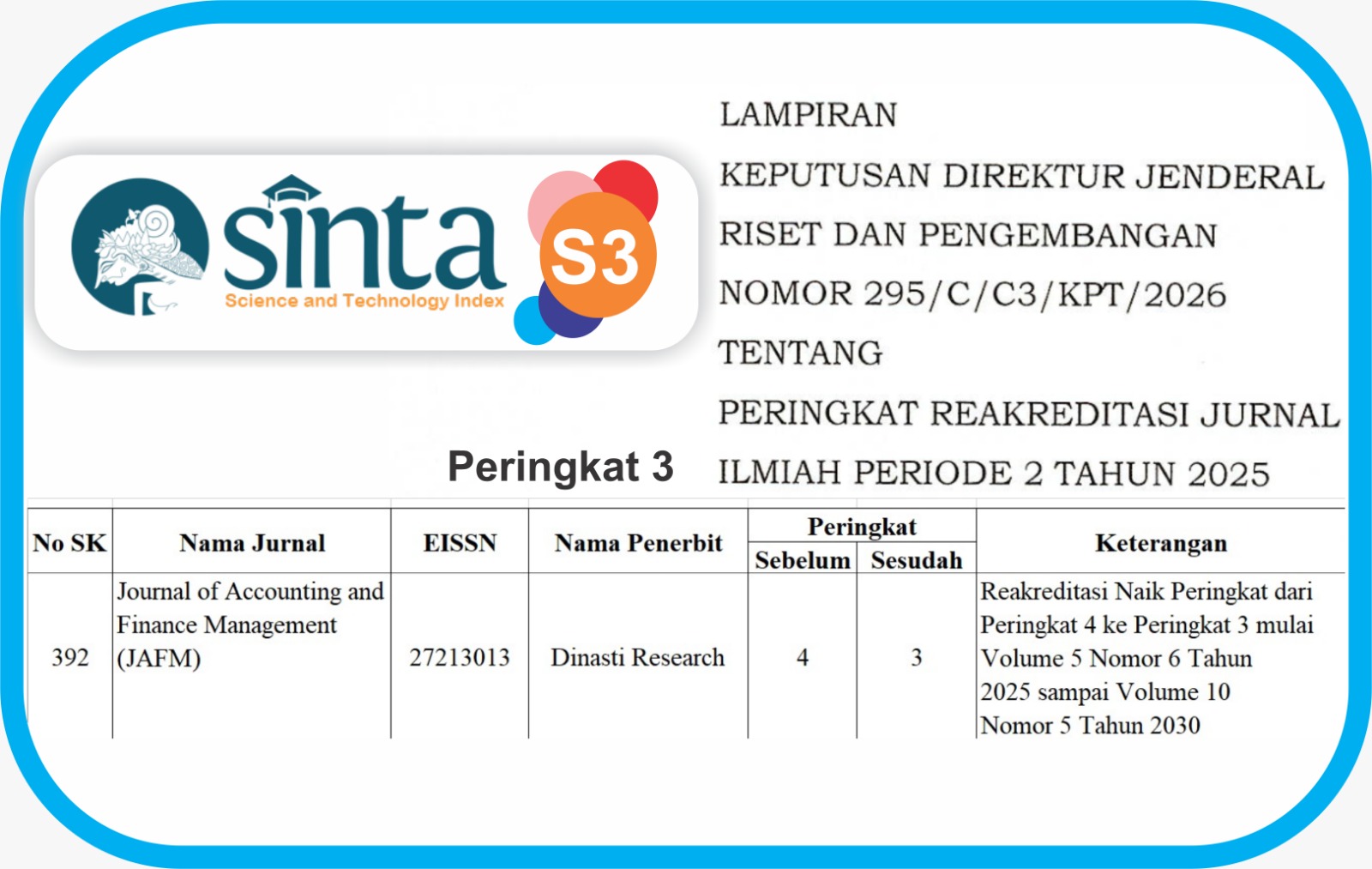Peran Persepsi Keadilan sebagai Mediator pada Pengaruh Sistem Umpan Balik 360° Berbasis Mobile Application terhadap Kinerja Karyawan
DOI:
https://doi.org/10.38035/jafm.v6i4.2362Keywords:
Umpan Balik 360°, Persepsi Keadilan, Aplikasi Mobile, Kinerja, Digitalisasi, Manajemen Sumber Daya ManusiaAbstract
Penelitian ini bertujuan untuk menganalisis peran persepsi keadilan (distributif, prosedural, dan interaksional) sebagai mediator dalam pengaruh sistem umpan balik 360° berbasis mobile application terhadap kinerja karyawan. Penelitian dilakukan di PT. TTA, sebuah perusahaan pertambangan, dengan menggunakan aplikasi umpan balik yang dikembangkan secara internal. Studi ini mengadopsi pendekatan kuantitatif dengan pengumpulan data dilakukan melalui kuesioner berbasis likert yang disebarkan kepada karyawan di PT. TTA. Hasil penelitian menunjukkan bahwa sistem umpan balik 360° berbasis mobile application secara signifikan meningkatkan persepsi keadilan karyawan, terutama dalam hal distribusi, prosedur, dan interaksi. Selain itu, persepsi keadilan terbukti memediasi hubungan antara umpan balik tersebut terhadap kinerja karyawan. Implementasi teknologi ini memungkinkan pemberian umpan balik yang lebih objektif, transparan, dan fleksibel (dapat dilakukan secara real-time, kapanpun dan dimanapun), yang pada akhirnya meningkatkan kinerja karyawan. Penelitian ini memberikan kontribusi teoretis terhadap pengelolaan sumber daya manusia berbasis teknologi sekaligus menawarkan panduan praktis bagi organisasi dalam meningkatkan efektivitas sistem umpan balik 360° melalui digitalisasi.
References
Abboud, Samar (2021), “The Impact of 360 degree Performance Appraisals on Employee Retention”, The EUrASEANs: journal on global socio-economic dynamics, Vol. 3. p. 28.
Aguinis, Herman (2023), “Performance management around the world: solving the standardization vs adaptation dilemma”, IIM Ranchi journal of management studies, Vol. 2, pp. 159-170.
Baker, Nathan (2014), “Employee Feedback Technologies in The Human Performance System”,
Human Resource Development International, p. 477-485.
Bies, Robert J. & Shapiro, Debra L. (1987), “Interactional Fairness Judgments: The Influence of Causal Accounts”, Social Justice Research, Vol. 1, No. 2.
Chi, Nai Wen & Han, Tsu Shian (2008), “Exploring The Linkages between Formal Ownership and Psychological Ownership for The Organization: The Mediating Role of Organizational Justice”, Journal of Occupational and Organizational Psychology, p. 691–711.
Church, Allan H. & Burke, W. Warner (2018), “Four Trends Shaping the Future of Organizations and Organization Development”, OD Practitioner, Vol. 49 No. 3.
Craig, Bart & Hannum, Kelly (2006), “Research Update: 360-Degree Performance Assessmen”, Consulting Psychology Journal: Practice and Research, Vol. 58, No. 2, 117–122.
Daniels, Aubrey C. Daniels & Bailey, Jon S. (2014), “Performance Management: Changing Behavior that Drives Organizational Effectiveness”, International Society for Performance Improvement, Vol. 53.
Dina Prasetyaningrum (2020), “Analysis of performance appraisal system with 360 degree feedback method in PT. PERTAMINA RU IV (PERSERO) Cilacap” The Management Journal of BINANIAGA Vol. 05.
Drew, Glenys (2009), “A ‘360’ degree View for Individual Leadership Development”, Journal of Management Development, Vol. 28, pp. 581-592.
Fleenor, John W. & Prince, Jeffrey Michael (1997), “Using 360-degree Feedback in Organization”, Center for Creative Leadership.
Habibi, Roni & Glory, Artha (2023), “Systematic Literature Review: Metode Penilaian Kinerja Karyawan Menggunakan Human Performance Technology”, Journal of Applied Computer Science and Technology (JACOST), Vol. 4, 100-107.
Hajiheydari, Nastaran & Ashkani, Mahdi (2018), “Mobile Application User Behavior in the Developing Countries: A Survey in Iran”, Information Systems, IS 1310.
Jepsen, Denise M. & Rodwell, John (2010), “Female Perceptions of Organizational Justice”, Gender, Work and Organization,
Karkoulian, Silva, dkk. (2019), “The Moderating Role of 360-degree Appraisal between Engagement and Innovative Behaviors”, International Journal of Productivity and Performance Management, Vol. 69 No. 2, pp. 361-381.
Karkoulian, Silva, Guy Assaker & Rob Hallak (2015), “An Empirical Study of 360-degree Feedback, Organizational Justice, and Firm Sustainability,”, , Journal of Business Research.
Lawrence, Paul (2015), “A Best Practice Model for The Effective Deployment of 360° Feedback”, Development and Learning in Organizations: An International Journal, Vol. 29 Iss 6 pp. 13-16.
Marc-Antoine & Jacques Forest (2022), “The power of strength-oriented feedback enlightened by self-determination theory: a positive technology-based intervention”, Journal of Happiness Studies.
Marthouret, Eloïse & Sigvardsson, Sofie (2016), “The Effect of Quick Feedback on Employee Motivation and Performance”, Linköping University - Atlantis Program, SE-581 83.
Meister, Jeanne C. & Willyerd, Karie (2020), “The 2020 Workplace”, Harvard Business Review.
Miner, John B. (2007), “Organizational Behavior 4: From Theory to Practice”, M.E. Sharpe, Inc., p.94.
Oh, In-Sue & Berry, Christopher M. (2009), “The Five-Factor Model of Personality and Managerial Performance: Validity Gains Through the Use of 360 Degree Performance Ratings”, Journal of Applied Psychology, Vol. 94, No. 6, 1498 –1513.
Oshodi, John Egbeazien (2011), “Should Academic Institutions In Nigeria Use The 360-Degree Feedback System For Employee Appraisal?”, European Journal of Business and Management, Vol 3, No.5.
Sabitah, Nadiyah Muhana & Susilo, Heru (2017), “Implementasi Metode Penilian Kinerja 360 degree Feedback untuk Mengukur Soft Competence Karyawan”, Jurnal Administrasi Bisnis (JAB), Vol. 47 No.1.
Saunders, M.N.K., Thornhill, A. dan Lewis, P. (2002). “Understanding employees’ reactions to the management of change: An Exploration through an organizational justice framework”, Irish Journal of Management, 23 (1), p. 85- 101.
Schullery, Nancy M. (2013), “Workplace Engagement and Generational Differences in Values”, Business Communication Quarterly, p. 252–265.
Sedarmayanti (2017), “Perencanaan dan Pengembangan Sumber Daya Manusia untuk Meningkatkan Kompetensi, Kinerja, dan Produktivitas Kerja”, PT. Refika Aditama, p. 285.
Sugiyono. (2018), “Metodologi Penelitian Kuantitatif dan kualitatif”, Bandung: Alfabeta.
Thibaut, John Thibaut & Walker, Laurens (1975), “Procedural Justice: A Psychological Analysis”, Hillsdale, N.J.: Lawrence Erlbaum Associates, Vol. 1289.
Downloads
Published
How to Cite
Issue
Section
License
Copyright (c) 2025 Farkhan Liandra Bunaiyya, Jati Waskito, Lukman Hakim

This work is licensed under a Creative Commons Attribution 4.0 International License.
Authors who publish their manuscripts in this journal agree to the following conditions:
- The copyright on each article belongs to the author(s).
- The author acknowledges that the Journal of Accounting and Finance Management (JAFM) has the right to be the first to publish with a Creative Commons Attribution 4.0 International license (Attribution 4.0 International (CC BY 4.0).
- Authors can submit articles separately, arrange for the non-exclusive distribution of manuscripts that have been published in this journal into other versions (e.g., sent to the author's institutional repository, publication into books, etc.), by acknowledging that the manuscript has been published for the first time in the Journal of Accounting and Finance Management (JAFM).



























